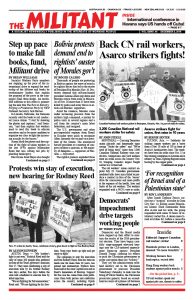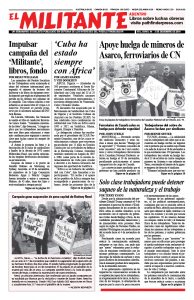After Israeli Defense Forces carried out a “surgical” airstrike in Gaza City Nov. 12, killing senior Palestinian Islamic Jihad commander Baha Abu al-Ata and his wife, the group responded with some 50 hours of retaliatory rocket fire. A dozen more Israeli airstrikes hit, before a cease-fire was brokered by Egyptian and U.N. officials.
For the first time, Tel Aviv targeted only this smaller Islamist group, avoiding attacks on Hamas, the bourgeois Islamist force which administers the Gaza Strip. Hamas fighters also initially stayed on the sidelines.
Tel Aviv was trying to widen bitter divisions between Hamas, in charge of Gaza and under pressure from the rulers in Egypt and Qatar, and Islamic Jihad, reliant on the bourgeois clerical rulers in Iran. The counterrevolutionary regime in Tehran swears it will wipe Israel — and its people — “off the map.”
For the first time in six months Hamas officials called off what have been weekly violent protests along the border fence with Israel.
The 2 million Palestinians in the Gaza Strip have lived under severe trade restrictions for 12 years imposed by Tel Aviv with the collaboration of Egyptian authorities. Half the population is under 18, a third of whom are unemployed. Hamas maintains its rule by dispensing aid obtained primarily from Qatar’s rulers.
The truce was disrupted by more rockets fired Nov. 14, followed by Israeli retaliation. The IDF blamed Hamas for 10 missiles fired from Gaza City the next day and bombed three Hamas compounds.
A Nov. 13 Israeli strike killed a sheep-herding family of eight. The government admitted the “mistake” as it was meant to hit another Islamic Jihad commander.
Islamic Jihad launched 450 rockets. Most misfired or were taken out by Israel’s Iron Dome missile defenses. Some did hit populated areas, causing scores of injuries, but no fatalities. Israeli retaliation in Gaza has killed 34 people and injured 111.
Political foes of Israeli Prime Minister Benjamin Netanyahu accused him of starting hostilities — with the inevitable Islamist rocket retaliation guaranteed to lead to a surge of support for further military action at home — to cobble together a government. Despite two elections in Israel this year, neither Netanyahu nor his opponents have been able to form a majority bloc.
In the Sept. 17 election, Netanyahu’s party won 32 Knesset seats out of a total of 120. That is one behind the Blue and White party, led by his main rival, Benny Gantz. Neither has been able to form a government.
Seeking to rally support, Netanyahu said Nov. 16 that the country faces a “historic danger to Israel’s security” if Gantz were to get a majority with the support of representatives elected on the Joint List, a coalition of Arab parties, the third largest faction in the Knesset.
Joint List Chairman Ayman Odeh responded, telling Netanyahu, “The Arab and Jewish citizens are more important than you.”
The working-class road forward
The Socialist Workers Party 2017 statement “For Recognition of a Palestinian State and of Israel” points a way forward out of this seemingly endless fighting. It starts from the “political necessity for the Israeli and Arab governments and leaderships of Palestinian organizations to begin immediate talks to recognize both Israel and an independent Palestinian state.”
“Such an agreement must recognize the right of Jews everywhere to take refuge in Israel in face of the global rise of Jew-hatred and anti-Semitic violence, as well as the unconditional right of the dispossessed Palestinian people to a contiguous, sovereign homeland.”
It points to the history of imperialist domination in the region, including the “ruthless colonial and national oppression across the Arab and Muslim countries, as well as the genocidal crimes of the Holocaust, the murderous pogroms preceding it across Eastern and Central Europe and Russia, and the enduring reality of Jew-hatred in today’s crises-ridden capitalist world.”
The statement’s starting point is “the class interests and solidarity of workers and toiling farmers across the Middle East — be they Palestinian, Jewish, Arab, Kurdish, Turkish, Persian or otherwise, and whatever their religious or other beliefs — as well as working people in the United States and around the world.”
“We are for whatever helps working people organize and act together,” the SWP says, “to advance our demands and struggles against the capitalist governments and ruling classes that exploit and oppress us.
“We are for whatever renews class solidarity and self-confidence, advancing us along a revolutionary course toward a united struggle for workers power.”

